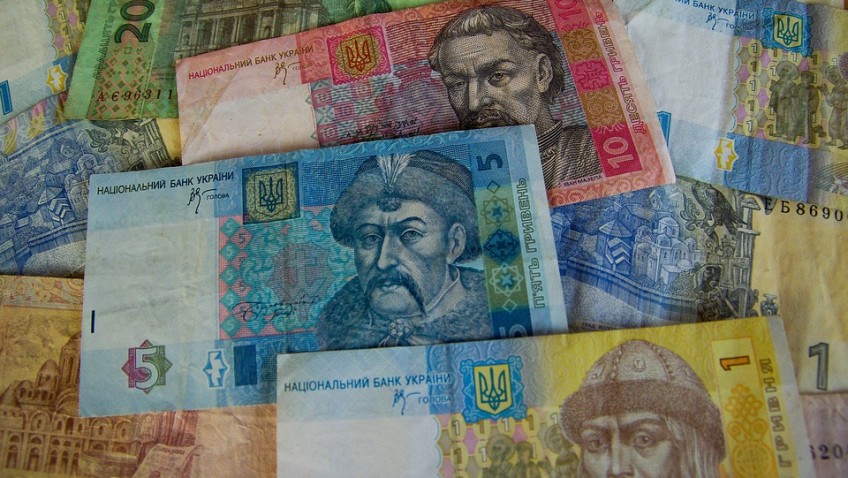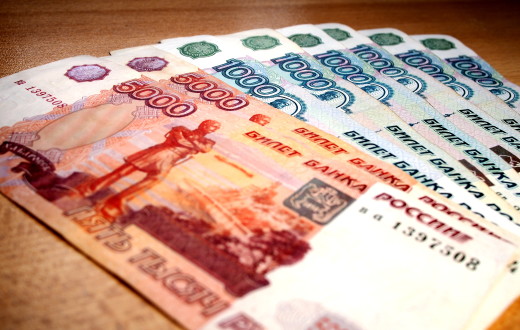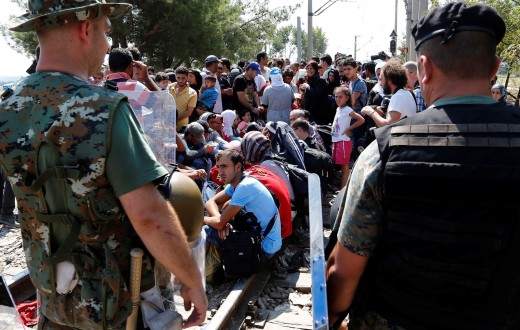The war in the Eastern part of Ukraine has been the biggest contributor to economic turmoil in the country, negatively affecting the lives of civilians in areas remote from the hot spots of conflict. This is not to say that only the separatists are to blame for Ukraine’s horrible state of affairs. The lack of an efficient economic strategy, dodgy behind-closed-doors negotiations, disdain for reforms and the plague known as corruption all spurred on Maidan. It has now become clear that kicking out Yanukovych and his team was not the ultimate solution to all these problems. The new government seems to be just as incompetent at handling the economy as the old was.
In the last days of December 2008, my mother and I were standing in line at a bank. The dollar exchange rate had recently jumped from 5 hryvnias (Ukraine’s national currency) to 8 in the wake of the Great Recession. We had come to sell our dollars and get some extra cash right in time for the holiday season. That exchange ratio stayed stable for the next five years until last year with the hryvnia/dollar rate now standing at 27:1.
In the February of 2015 I once again went to a bank to withdraw dollars and was informed by the cashier that there was no money available at this branch and that I would need to order it from another branch and collect it the following day. This would cost me 300 hryvnias ( $10), but since I had no other choice, I quietly obeyed. The woman standing behind me in line overheard our conversation and asked if I would sell her the dollars I would get the next day for 31 UAH per buck, 15% above the official exchange rate.
Ukraine’s currency crisis began to worsen dramatically right after the Maidan revolution and Russian annexation of Crimea in March. The National Bank of Ukraine (NBU) was not effective in coping with the situation. In June President Petro Poroshenko appointed Valeria Hontareva, a former investment banker, as a governor of the NBU. She proceeded to prohibit banks from providing foreign currency loans to be used within the domestic market and capital controls in the form of bans on foreign exchange purchases by companies through banks and the limitation of purchases by banks to .5% of their capital.These highly questionable and controversial decisions of the new governor have not helped her public image or Ukraine’s economy. The economy of Ukraine shrank at an annualized rate of 14.8% in the last quarter of 2014 and the gross domestic product fell 6.9% last year. The International Monetary Fund forecasts another 5.5% GPD fall in 2015, but even these disappointing numbers might prove to be way too optimistic.
Last autumn the NBU switched to an indicative exchange rate which was defined by them daily and served as the benchmark for Ukrainian banks. The banks then used this rate to establish interbank loans between themselves. However, the market exchange rate differed greatly from the indicative rate that the NBU defined. In the beginning of February, the NBU decided to scrap the indicative rate and move toward a free-floating one sending the hyrvnia’s value into freefall.
Ukrainians responded with great discontent towards the actions of the NBU. The seeds of panic were sown in a fertile soil of public distrust in government and their policies, and were quick to bear fruit: while dollars were not available at commercial banks, black market exchanges bloomed. At one point the rate of the hryvnia to the dollar was 40:1. This is an insane number, considering that the official minimum salary in Ukraine is slightly more than 1200 hryvnias, which left millions of Ukrainians with a monthly income of as little as $30! People rushed to buy basic goods before the prices climbed up, leaving supermarkets looking post-apocalyptic with empty stalls and food displays.
Prices have also risen considerably in the past weeks. Ukraine is an import-oriented country, so the majority of goods are bought from within and paid for in dollars or euros by the distributor. These businesses need to make some profit, so keeping prices at the old rate was impossible. This applies not only to clothing, which now costs twice as much as a month ago, but also fees for public transport because of the dramatic rise in fuel prices.
My favourite game as a kid was pretending I owned a bakery and selling mud pies to my 5-year old buddies. But Ukrainian kids didn’t have to use fake money for their games, they could just trade coupon (karbovantsi) (the currency used before hryvnia was introduced in 1996). One of the highest rates of inflation in world history caused karbovantsi to have no actual monetary power in the mid-90’s and created a situation akin to inter-war Germany. When the hryvnia was introduced, the exchange rate of the karbovantsi to the hryvnia was 100,000:1. It was a common sight to see a man with a suitcase filled with now useless cash waiting in line at an exchange. And those who were not patient enough to spend countless hours in bank lines just gave thousands of karbovantsi to their kids to play with, to our great enjoyment, I have to admit. We bitterly joke now that history has a tendency to repeat itself, and with the hryvnia going weak maybe our kids will also have the chance to play with useless papers that were once money in the not so distant future.
There are some bright points now though. After the first wave of massive panic had passed, the dollar exchange rate returned to 26 hryvnias to one. Also the International Monetary Fund has given Ukraine a $5 billion down payment despite the war with Russian-backed separatists going on in the East. That is the first part of a $17.5 billion commitment the IMF has made to Ukraine after the government approved a range of important reforms to battle corruption.
Ukraine is dealing with a contracting economy, high inflation, war and a lack of jobs for over a million refugees.In a complicated situation like this the chances run high that the new pro-European government might slide back into the old routine of corruptio69.html%20hn and misuse the money the IMF has given it for implementing reforms. So now it’s up to Ukraine to restore the trust it has been given by the world and start rebuilding its economy by making sound financial decisions.




0 comments